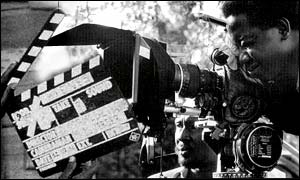


Posted by Ghana Web on



The emerging competition between Ghanaian and Nigerian filmmakers was given a boost at the 7th African Students Film and Television Festival dubbed: "ANIWA 2005," where the two countries picked four prizes each.
Accra, Sept. 9, GNA - The emerging competition between Ghanaian and Nigerian filmmakers was given a boost at the 7th African Students Film and Television Festival dubbed: "ANIWA 2005," where the two countries picked four prizes each.
Ghana's "Domestic Violence, "film an excellent piece of work that highlights the sensitive issue of domestic violence was adjudged the best Documentary, whilst Nigeria's "Hope Against Hope," which trumpeted the social message on HIV/AIDS menace was deemed the best Drama production for its relevant to fight against the pandemic. Other films that made the mark were: Ghana's "Justice," an excellent representation of miscarriage of justice and "Thorns For Supper," highlighting of sports hooliganism were adjudged the best fiction production.
A Television opera: "Property," which seeks to address the issue of the disadvantaged groups rights to property and inheritance in Africa was selected as the best TV production.
Nigeria's "Falling In Line," described by the jury as a creative exploration of the possibilities of new technologies was adjudged the best animation; the best musical was "Bounce," a distinguished creative and refreshing musical production and "Fate," for promoting African Folklore.
A South African production, "Ga Rankuwa (Hotel School) exhibiting excellent skills in promotional presentation was adjudged the best debut.
Announcing the awards at the closing ceremony of ANIWA 2005, Ms Masepeke Sekhukhuni, Director of Newtown Film and Television School of South Africa said 48 productions entered the competition. They were: Fiction 15; Documentary 12; Training nine; Debut eight; Musical seven; Television seven; Animation five and Drama two. Ms. Sekhukhuni, who chaired the jury said Ghana, Nigeria, South Africa, Gambia, Burkina Faso and Kenya participated in ANIWA 2005, which was on the general theme: " Liberating the Mind; Revolutionary Possibilities for New Technologies."
She expressed concern about the decline in craftsmanship in film production, especially in story development and script, sound, lighting, directing, editing, innovative use of music, use of archival footages and innovation in set designs.
The 12-day festival, organised by the National Film and Television Institute (NAFTI).
According to Mr. Martin Loh, Director of NAFTI the choice of the theme was to remind cinema and television professionals to shift emphasis to the production of materials that would enable them to overcome superstition, ethnicity, civil strife, fear, violence and other negative cultural practices that undermined the Continent's search for development.
He said the event organised annually was intended to bring together teachers, students and professionals to acquire new knowledge and share experience and skills.
Mr Loh said ANIWA had gained international recognition as a major student film and TV event in Africa and must be sustained. He, therefore, urged African regional groupings such as the African Union and New Partnership for Africa's Development (NEPAD) with other international development partners to support film and television institutions with resources for they held the key to development. Mr. Bill Kwabena Marshall former Director of NAFTI chaired the ceremony where all participation students were presented with certificates of recognition.

